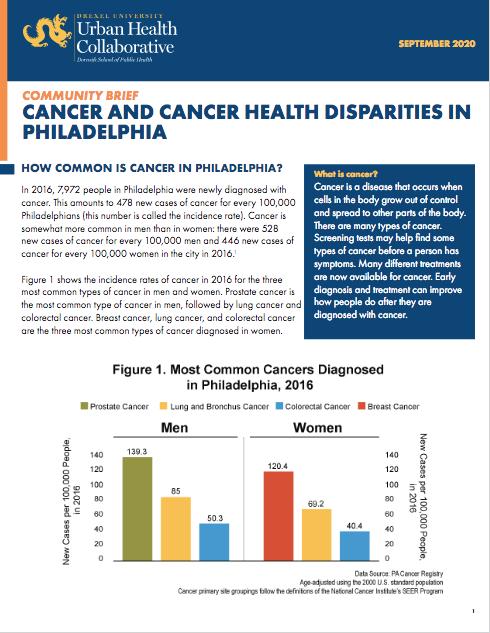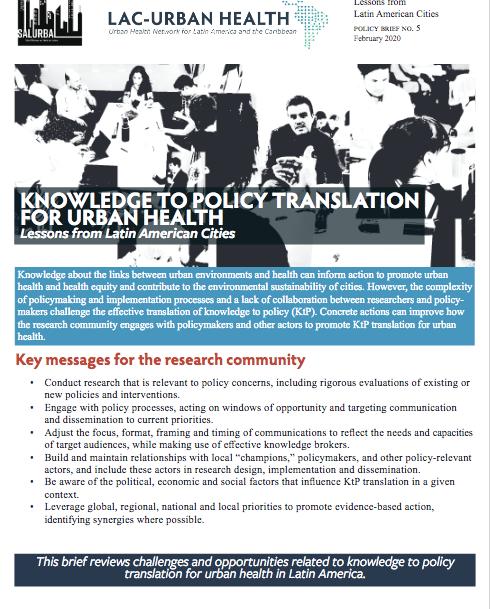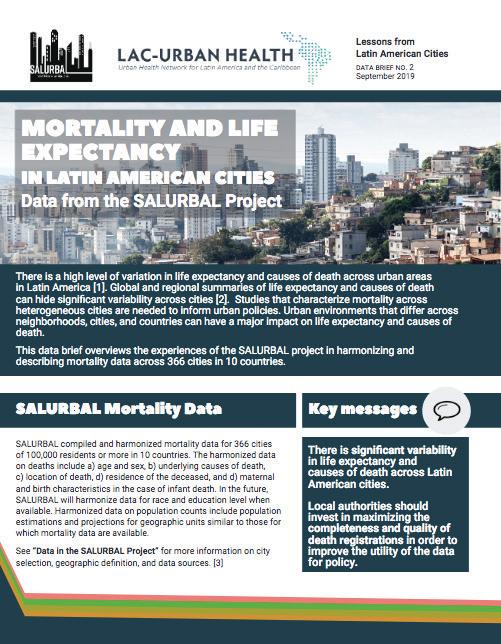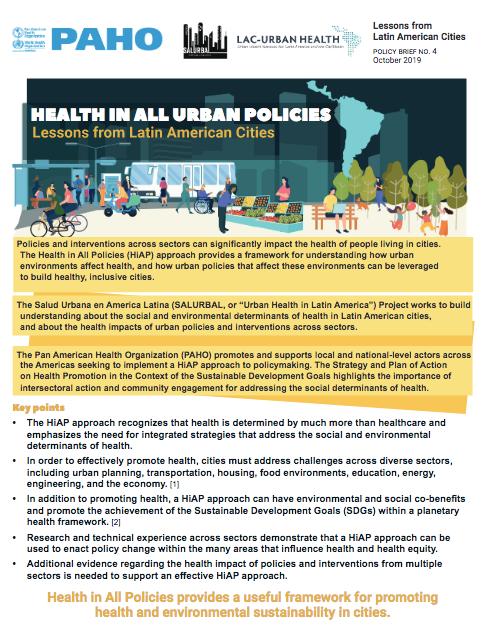
7 minute read
New Grants
Data Briefs The UHC produces briefs to disseminate information to a range of stakeholders. In the past year the UHC published the following briefs:
COVID-19 in Context Data Brief Data show that COVID-19 is affecting African Americans in Philadelphia at disproportionately high rates. This brief explores the structural patterns of racism and residential segregation contributing to the COVID-19 pandemic in Philadelphia neighborhoods.
Estimating Health in Small Areas Methods Brief Health data available for small areas is often limited because few events occur or because the number of respondents to a health survey living in the area can be small. This brief explains small area estimation techniques as a way to provide more reliable estimates when sample sizes for certain areas are small.


Cancer and Cancer Health Disparities Community brief This brief explores cancer and cancer disparities in Philadelphia. It examines cancer incidence and mortality and uses of cancer screening. It also takes a closer look at some of the risk factors in Philadelphia contributing to cancer.
Knowledge to Policy Translation for Urban Health: Lessons From Latin American Cities The lack of collaboration between researchers and policymakers along with the complexity of policymaking can prevent vital information on health equity and sustainability from being passed along. This brief, developed by the SALURBAL project, reviews challenges and opportunities related to knowledge to policy translation for urban health in Latin America.


Mortality and Life Expectancy in Latin American Cities: Data From the SALURBAL Project Data shows that there is significant variability in life expectancy and causes of death across Latin American cities. This data brief presents the experiences of the SALURBAL project in harmonizing and describing mortality data across 366 cities in 10 countries and describes preliminary research findings developed with this data.
Health in All Urban Policies: Lessons From Latin American Cities The Health in All Policies (HiAP) approach provides a framework for understanding how urban environments affect health, and how urban policies can be leveraged to build healthy, inclusive cities. This brief describes initiatives by the SALURBAL project and the Pan American Health Organization (PAHO) to advance HiAP implementation. On October 31, SALURBAL and PAHO officially launched and presented the brief to the mayor of Paipa, Colombia.

Policy Surveillance 11 The Drexel Urban Health Collaborative initiated a Policy Surveillance Project in 2017 that focused on urban centers with active policy debate. This project began by monitoring four cities – Philadelphia, New York City, Washington, DC, and Los Angeles. Policies and programs related to the social determinants of health – including education, the environment, and housing – were the focus. In the second half of 2019, the project was expanded to three cities in the Midwest and South Eastern United States: Birmingham, AL, Louisville, KY, and St. Louis, MO. New project partners, teams of researchers, and students from the University of Alabama, Birmingham, University of Louisville, and St. Louis University, in partnership with local health departments have begun monitoring and surveilling their own cities using the methods developed by the UHC. The expansion of the project and engagement of new academic partners provides increased opportunities to examine urban policy and program trends across the US and allows for comparison among cities.
UHC by the Numbers
• 23 grants submitted totaling 19.1 million in research expenses
• 26 grants housed at the UHC totaling 4.75 million in annual direct grant expenditures
• 7 doctoral students supported on grants • 5 postdoctoral research fellows • 9 trainees supported on UHC fellowships
• 4 master’s depth experiences funded
• 27 total staff at the UHC
• 25 UHC Brown Bag seminars

• 3 Invited Speaker presentations
• 105 Urban Health Summer supported on grants
Institute registrants
• 79 peer-reviewed research publications in 56 different journals
• Over 6,000 social media mentions of UHC publications (and counting!)
COVID-19 Inequities Among Hispanics in U.S. Cities Funded by NIH and led by Usama Bilal, MD, PhD, MPH, and Mariana Lazo, MD, PhD, ScM, this project aims to create consistent estimates of racial/ethnic inequities in COVID-19 outcomes for Hispanics in the U.S. Creating consistent estimates is key to exploring trends and predictors of these inequities to improve the specific targeting of interventions that may prove key in continuing to control current waves of the pandemic and to prevent future waves.
Cardiometabolic Risk Development and Management in Changing Neighborhoods Sharrelle Barber, ScD, MPH was recently awarded a 5-year grant, from the National Institutes of Health. The grant will build on the partnership established between the Drexel University Dornsife School of Public Health and the Jackson Heart Study, a cohort study of cardiovascular disease among African Americans in Jackson, MS with an established network and scientific working groups. The research will use state-of-the-art epidemiologic data from the Jackson Heart Study cohort linked to well-characterized neighborhood data over a 20-year period. Barber will lead a research team that will examine how changes in physical and social features of the neighborhood environment influence hypertension and diabetes incidence and management.

Big Cities Health Coalition Data Platform There is growing interest in generating data platforms that allow comparisons of key outcomes across cities and over time for benchmarking, descriptive and associational analyses, and for potential use in evaluation of policies or interventions. In the context of the broader needs assessment and partnership between the Big Cities Health Coalition (BCHC) and UHC, the UHC was awarded funding from de Beaumont Foundation to redesign and rethink BCHC’s data platform (including data elements, process for updating, and potential uses) in ways that maximize value to the BCHC. Led by Ana Diez Roux, MD, PhD, MPH, and Amy Auchincloss, PhD, MPH the project will build on UHC’s expertise in analyzing and displaying spatial data.
Green spaces and climate-related heat mortality in Latin American cities 13 This study led by UC Berkeley and funded by the Welcome Trust, will use data gathered by the SALURBAL project (based at the UHC) to investigate how urban environments may influence health in the context of climate change. Specifically the project will examine the impact of temperature on mortality across nearly 400 cities in Latin America, evaluate how green space and other built environment features may buffer adverse health impacts, and use simulation modelling to estimate expected health impacts in the future for cities in the region under various climate change scenarios. Led by Ana Diez Roux, MD, PhD, MPH, the project also includes UHC team members Josiah Kephart, PhD, MPH, and UHC affiliates Brisa Sánchez, PhD, and Leah Schinasi, PhD.
Racism, Residential Segregation and COVID-19 in Philadelphia: Mobilizing Data for Action During the Pandemic This grant is was awarded by the Alumni Network Activation Fund. Led by Sharrelle Barber, ScD, MPH, this project will examine residential segregation as a fundamental driver of the COVID-19 pandemic in urban settings. The proposed project will combine descriptive spatial data analyses and digital storytelling to examine the links between structural racism, residential segregation and COVID-19 pandemic in the city of Philadelphia. Ultimately, this project seeks to shape the narrative around emerging racial inequalities and mobilize data for action with a focus on both short-term and long-term policy solutions.

An Evaluation of Road Traffic Safety Initiatives in Leon, Mexico and Buenos Aires, Argentina The Partnership for Healthy Cities is a global network of cities funded by Bloomberg Philanthropies that are working to reduce noncommunicable diseases and injuries. The goal for each city is to implement a proven intervention, as identified through WHO’s “best buy” policies and “best practice” road safety interventions. Both Leon, Mexico and Buenos Aires, Argentina implemented new or improved policies to reduce drunk driving, including expanding sobriety checkpoints and implementing a mass media campaign about the policies. With funding from Bloomberg Philanthropies, and building on the work of the SALURBAL project, Alex Quistberg, PhD, MPH and the project team are evaluating the impact of these policies on road traffic injuries and deaths using insurance claims, police reports and death records combined with other data on the built and social environment.






